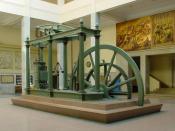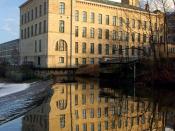From the beginning of history to the year of 1800, the work of man was done by hand tools. However, during the year of 1800 the shift from hand tools to power machinery occurred and was called the Industrial Revolution. The Industrial Revolution grew gradually out of the technical practices of earlier times. The first country to be affected by the Industrial Revolution was Great Britain.
First, Great Britain practiced the policy of mercantilism. Great Britain expanded her Atlantic economy by mercantilism. The British merchant could sell more if only more could be produced. In order to increase profit faster methods of production were needed. Cotton had been already imported from Asia but by hand Europeans could not compete with the East. However the market was endless if cotton could be spun, woven, and printed with less labor. The colonial empire that Great Britain built was enlarged by a strong position in Latin America and in the African Slave Trade which provided a growing market for British manufactured goods.
Britain's domestic market also flourished during this time interval. It was cheaper to ship goods by boat instead of land transportation. Beginning in the 1770's a canal building boom greatly enhanced this natural advantage. Rivers and canals provided easy movement of England's enormous deposits of iron and coal.
Secondly, agriculture played a significant role in the bringing about of the Industrial Revolution in Britain. Many landowners seeking to increase their money incomes began to experiment with improved methods of cultivation and stock raising. Landowners made use of fertilizers (mainly animal manure). They introduced new implements such as the "drill seeder" and "horse-hoe". They developed new methods such as crop rotation and attempted to breed larger sheep and fatter cattle. Since the landowners who controlled parliament they proposed enclosure acts...


